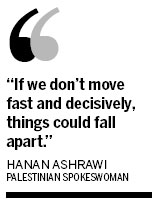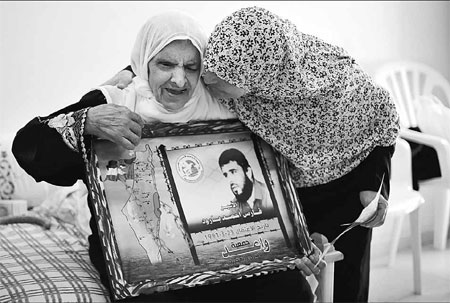Mideast peace talks to resume
|
Rayya (left), mother of Fares Baroud (in photo), a Palestinian who has been held prisoner by Israel for 22 years, smiles after hearing news on the possible release of her son in her house at Shati refugee camp in Gaza City on Sunday. Baroud was expected to be among more than 100 Arab prisoners to be freed as a step to renew stalled peace talks with the Palestinians ahead of plans to convene negotiators in Washington later this week. Suhaib Salem / Reuters |

Optimism in short supply after two decades of failed attempts
Israeli and Palestinian teams flew to Washington on Monday to end a long diplomatic stalemate and prepare for a new round of Middle East peace talks, though optimism was in short supply after two decades of failed attempts to reach a deal.
The resumption of talks was made possible by a decision by Israel's Cabinet on Sunday to free 104 long-held Palestinian prisoners in four stages, linked to progress in talks. The release was part of an agreement brokered early this month by United States Secretary of State John Kerry to bring the sides back to the negotiating table.
Palestinian President Mahmoud Abbas has been reluctant to negotiate with Israeli Prime Minister Benjamin Netanyahu, fearing the hard-line Israeli leader will reject what the Palestinians consider minimal territorial demands.
The Palestinians want a state in the West Bank, Gaza and east Jerusalem, territories Israel captured in 1967, but have accepted the principle of limited land swaps to allow Israel to annex some of the dozens of settlements it has built on war-won lands.
Abbas had repeatedly said he would only go to talks if Israel either freezes settlement building or recognizes the 1967 lines as a starting point for drawing the border of a state of Palestine.
Palestinian officials reiterated on Monday that they received assurances that Washington considers the 1967 lines the basis for border talks.
However, a senior Abbas aide acknowledged that Israel has not signed on to that principle. He spoke on condition of anonymity because he was not authorized to discuss the issue with reporters.
Senior Israeli officials have also reiterated in recent days that settlement construction would continue. This time "all of the issues that are at the core of a permanent accord will be negotiated simultaneously", Silvan Shalom, a member of Netanyahu's cabinet and rightist Likud party, told Israel's Army Radio.
The Palestinian official said the expected prisoner release went a long way toward persuading Abbas to give negotiations another chance, even without Israel meeting his long-standing demands on the terms of such talks.
The US State Department said it would try to establish a work plan for the broader negotiations, which are to last six to nine months.
Hanan Ashrawi, a Palestinian spokeswoman, said the talks are being held under more difficult conditions than previous negotiations.
She cited the Palestinian political split, with Western-backed moderate Abbas and the Islamic militant Hamas running rival governments in the West Bank and Gaza, as well as the more hawkish positions of Netanyahu, compared to his predecessor.
"But I think there is a recognition of the urgency," she said. "If we don't move fast and decisively, things could fall apart."
Hamas, which seized Gaza from Abbas in 2007, has dismissed the new talks, and the militant movement's spokesman Sami Abu Zuhri on Monday rejected the notion that Abbas is representing the Palestinians at the talks.
Resuming negotiations "is a dangerous step and the only beneficiary is the occupation (Israel), which uses it as a cover for its continued crimes," Abu Zuhri said.
Hamas wants to establish an Islamic state in all of historic Palestine, including what is now Israel. Hamas has raised the possibility of long-term cease-fires under some circumstances, but has made clear it would not consider a partition deal to be the end of the Israeli-Arab conflict.
The resumption of talks comes after six months of shuttle diplomacy by Kerry, and Israel's agreement to release veteran prisoners was key to the secretary's success.
The Israeli Cabinet decision was welcomed by Palestinians, and drew some angry reactions in Israel.
The fate of Palestinian prisoners is an emotional issue on both sides. Palestinians tend to view the prisoners as heroes who sacrificed for the struggle for statehood, while many Israelis see them as cold-blooded killers.
"The murderers will be released," read the front-page headline in Israel's daily newspaper Yedioth Ahronot on Monday.
In another sign of possible momentum, Martin Indyk, a former US ambassador to Israel who directs the foreign policy program at the Brookings Institution think tank in Washington, is expected to be named as the new US envoy for Middle East peace, possibly as early as Monday, a source familiar with the matter said.
China has always been willing to see a peaceful resolution to the issue. Chinese Foreign Ministry spokeswoman Hua Chunying said earlier this month in a news conference that China welcomes the resumption of peace talks and appreciates the joint efforts from the related sides.
China hopes that the two countries can overcome their difficulties and achieve substantial agreements as soon as possible, she said.
AP-Reuters-China Daily
(China Daily 07/30/2013 page11)















